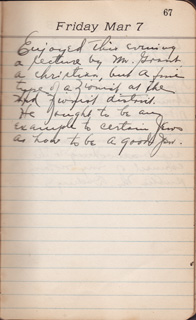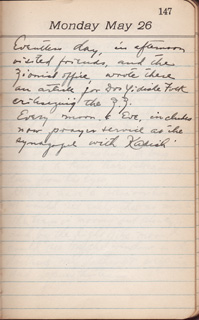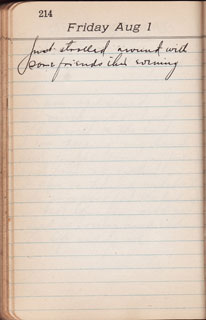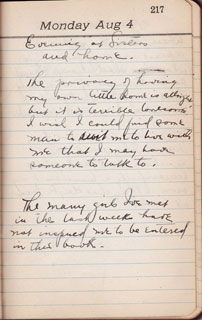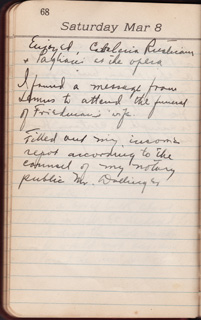
Enjoyed, Cabaleria Rusticany
and Pagliacci at the opera
I found a message from
Lemus to attend the funeral
of Friedman’s wife.
Filled out my income
report according to the
counsel of my notary
public Mr. Wallinger
————-
Matt’s Notes
Whenever possible I listen to the music, read the literature, and see the films Papa discusses in his diary, and recently I had the good fortune to see, at the Metropolitan Opera, the same double bill of Pagliacci and Cavalleria Rusticana Papa mentioned above. Until now any encounters I had with opera were purely accidental, the last one coming when I was a wee lad of 23 and then only because the words “free,” “ticket” and “girl” were involved. Though impressed with the players’ effort, I was generally distracted and came away feeling like I had missed the boat on opera appreciation.
So, to join the evening crowds at the Met — deliberately, with my own nice wife, and on my own power — and set down to pay attention was something I might never have done if I hadn’t started this diary project. And, as is always the case with the arts I experience on Papa’s “recommendation,” I found myself unexpectedly and powerfully absorbed by the proceedings. I was amazed, in general, because the things I saw and heard were the very things Papa saw and heard. This timelessness is, I suppose, an inherent quality of anything classical or traditional; even though Giovanni Martinelli sang Canio in 1924 and Salvatore Licitra sang him in 2007 (to raves from the New York Times) there’s a certain thrill to knowing Pagliacci has been essentially unchanged for generations.
But, there’s more to it than that; when I attended I was entirely awash in the sentimentality and melodrama of the work, and not just because Pagliacci and Cavalleria are so sentimental melodramatic. When I was a kid I used to pretend that Papa was hovering over my shoulder — in school, at home, when I was playing outside — hoping he was there to make sure everything came out all right. Maybe I still hope so; maybe that’s why I want to see the things Papa saw and do the things he did. It makes me I feel a little like we’re sitting side by side for a few hours, silently enjoying each other’s company. I know he would be beaming, smiling — fulfilled, entirely, just to be near me, to see me with my wife, to know I was alive. Under those circumstances, any song of love or loss or melancholy floating up from the stage becomes something else, the music for my own little opera, my duet with a ghost who I can’t touch or speak to but who means everything to me.
————————
Additional references for this post:
- Here’s some more information on Cavalleria Rusticana and Pagliacci from the Metropolitan Opera site
- The Metropolitan Opera house Papa went to was on Broadway and 39th Street, not far from the garment district where he most likely worked. The Met’s site has plenty of interesting historical information, and Wikipedia has a nice overview as well.
- Thanks to Daniel Kelley for the phrase “Duets with Ghosts,” which is the title of his new CD. Give it a listen if you know what’s good for you.
—————
Update 3/12
Mom adds about Papa’s love of opera:
I think Papa went very often, but was only able to afford standing room at that time. When I was growing up, he listened to the Met broadcast on radio, hosted by Milton Cross, every Saturday.
